Archive
• June 2005• July 2005
• August 2005
• September 2005
• October 2005
• November 2005
• December 2005
• January 2006
• February 2006
• March 2006
• April 2006
• May 2006
• June 2006
• July 2006
• August 2006
• September 2006
• October 2006
• November 2006
• December 2006
• January 2007
• February 2007
• March 2007
• April 2007
• May 2007
• June 2007
• July 2007
• August 2007
• September 2007
• October 2007
• November 2007
• December 2007
• January 2008
Friday, June 03, 2005
Interview: Jason McIntosh, Developer of Little Gods
By Tim W.
August 25, 2005
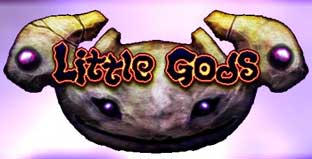
Little Gods could possibly the the best Breakout clone to come out of an independent developer this year. Grim Inventions uses the classic gameplay concept featured in Pong and Breakout to create their debut title, but with all sorts of extras and unlockable contents added by the developers for a rewarding gameplay experience. Also noteworthy is the graphics and audio treats that will keep fans glued to their monitor screens for some time.
We caught up with Jason McIntosh of Grim Inventions recently to talk about their latest release.
INTRODUCTION
Tim: Hi Jason. Thanks for taking time out of your busy schedule to speak with us. To start off, could you tell us about the people involved in the development of Little Gods?
Jason: There's me and Greg Tice, who did the art from concept to completion. Michael Huang (http://www.gamenoise.com/) did about 1/2 the sounds (the impressive ones, like the sounds of powers activating), and I did the rest. I licensed the music from shockwave-sound.com (nothing to do with the Shockwave you're thinking of).
I'm just your typical spikey-haired, black wearing, loud music-playing, rebellious father of three who happens to also make games. My only significant game development experience is an old total conversion for Quake II called Dawn of Darkness. Incidentally Greg worked with me on that, too. (Along with a huge team of guys, so don't go thinking we did it by ourselves.) If you dig really hard, you can still download Dawn of Darkness.
Greg is your typical black-wearing, loud music-playing, rebellious art genius. He's living in London to finish up art school.
 Tim: Any story behind the name Grim Inventions?
Tim: Any story behind the name Grim Inventions?
Jason: It's an expression of my taste for dark, creative works. We're not really living up to it yet, but I'm building slowly. You'll probably see our games become less mass market and get a lot darker and more story-oriented as we achieve more financial independence. Right now I just want to feed the kids. They eat like locusts.
Tim: Any previous projects?
Jason: We had a few partial/prototype games and a couple mods of various types that may later become full games.
DEVELOPMENT PROCESS
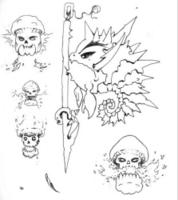 Tim: How long did it take to develop Little Gods?
Tim: How long did it take to develop Little Gods?
Jason: It took us about 1 year, although only about 6 months once I got Torque2D since the game art was mostly done by then. I had created my own engine in C++ but then decided to license Torque2D because it lifts the burden of maintenance and bug-fixing a lot so I can focus on the games more.
Tim: How about the engine and tools used?
Jason: A lot, actually. Torque2D, Eclipse editor, vaseline, Visual Studio 2003, Paint Shop Pro, clay and resin, Wacom digital tablet, and a whole lot of caffeine. About a mountain of caffeine.
Tim: Can you share with us your thoughts on the torque engine?
Jason: If you don't want to work a certain way or are a stubborn goose, then it won't float your boat. If you can adapt to its way of doing things, it will serve you pretty well. Torque2D isn't quite feature complete, but overall it's a very nice, shiny piece of work.
ARGUS TEACHES MULTIPLICATION FACTS
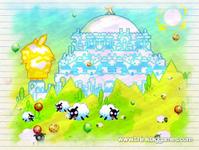 Tim: Do tell us a little about your other project, Argus Teaches Multiplication Facts.
Tim: Do tell us a little about your other project, Argus Teaches Multiplication Facts.
Jason: Originally I made that for the my kids, and it turned out nice so I asked Greg to hook me up with some art, and we put it out for sale. I learned my math facts all over again while testing it. So I know it is effective!
Tim: How was the response for that game?
Jason: It's a specialized product in a very hard to reach market, so it's been rather slow, let's say. Mac users seem to really like it, though. All sales are from the Mac version. I don't know what that means about PC users.
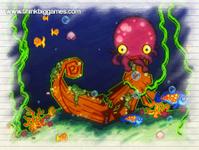 Tim: Any knowledge from developing Argus that proved useful when creating Little Gods?
Tim: Any knowledge from developing Argus that proved useful when creating Little Gods?
Jason: Yes, everything I did in Argus helped me with Little Gods, so that's the real payoff. I learned Torque and got the work done a lot faster because of it.
LITTLE GODS
Tim: How does your working schedule sounds like, while doing development for Little Gods?
Jason: Let's see. I punt the kids onto the bus, kiss my lady as she heads off to work, walk bleary-eyed to my office downstairs, miss the chair when I try to sit down, fall straight on my ass, wake up immediately when I hit the floor. Then I plug into the caffeine I.V., fire up the editor and start coding.
Tim: What was the biggest difficulty you've faced while developing the game?
Jason: Making it to the end. Really, there were a lot of times I want to poke out my own eyes because I was so sick of the game, but the professionals finish--and so I had to put new batteries into my cyborg clone and let him do most of the real work.
Tim: Were there any other names considered for the game? Why did you choose the name Little Gods?
Jason: Little Gods refers to the fact that you have god-like powers but you aren't really a deity. The characters in the game are only given their powers by Pillboa (the big kahuna of the realm), so they're kind of Rental Gods, if you prefer that name.
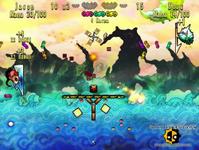 Tim: How did the idea for Little Gods came about? And what was your inspiration for making the game?
Tim: How did the idea for Little Gods came about? And what was your inspiration for making the game?
Jason: The gameplay was developed organically, but started based on an old Amiga game I made about 6 thousand years ago. I usually got new ideas while about to fall asleep after an 18 hour programming massacre and then forced myself to rise and write it down. I think a lot of weaknesses in the interface are from these changes that came late in the process.
Tim: What about the story? Did you ever had plans to include cutscenes to tell the story?
Jason: There was a Story Mode in the game that told the story of each character, why they were in this place doing this ridiculous ritual with these little pillbug creatures (the balls). The story is basically that your character has died and really screwed up something, and by a strange twist of fate you landed in this realm called The Everything where you have a chance to get your life back and live it the right way this time. So that's what the duel is about. You are fighting to get your life back for one reason or another, and each character has a story about this. I took out Story Mode because it was taking too much time to develop. Secondarily, the stories I created were really too serious and dark for this game.
We considered doing some comic-style stuff, but probably won't. That idea is not dead, though, so you can expect some of our later work to include that type of thing as promotional material.
Tim: The music, the production style, it's kind of like something that Tim Burton would do if he ever produced a game. has anyone else suggested this as well?
Jason: That's very flattering to hear! But it's really just a combination of my tastes and Greg's style. I knew I didn't want any techno or loud rock and roll music. I wanted something totally different to disarm players with. And the art style was a decision to try and balance a dark look with cuteness. Greg is very good at that.
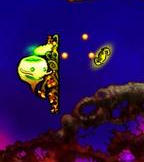 Tim: Could you describe a little about the game modes available for those who are reading this interview and have not experienced the game itself.
Tim: Could you describe a little about the game modes available for those who are reading this interview and have not experienced the game itself.
Jason: The main game is basically Pong. You knock the ball back and forth and try to make your opponent miss so you get a goal. But also it's like Arkanoid because there are bricks in the middle that you can smash up to get trinkets and goodies from. But as a whole it's like neither, because the bricks in the middle move and respond to what you do, and then you can invoke your god powers and affect your opponent or the balls to help win the match.
The unlockable modes are pretty simple but offer a new kind of challenge for the levels. For instance, Rapid Attack is a mode where you go really, really fast and so do the balls. The rounds are over quick because you usually can't get the balls fast enough, but it's a lot of fun to try.
Tim: Will mouse controls be implemented? i noticed that this option wasn't available for players.
Jason: I'm still debating with myself about it.
Tim: I kept expecting to hear voice or some sort of speech from the characters. Was this ever considered for the game?
Jason: We had all kinds of stuff planned, but time killed most of it. I wanted to have blurbs for each character at the end of a round when they won or lost to give them more personality. We just ran out of time.
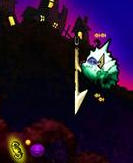 Tim: Any thing you're particularly proud of about Little Gods? Something that you didn't think was possible for this project but you've accomplished it in the end? Or a feature that other paddle games do not have, that would probably be copied by other developers.
Tim: Any thing you're particularly proud of about Little Gods? Something that you didn't think was possible for this project but you've accomplished it in the end? Or a feature that other paddle games do not have, that would probably be copied by other developers.
Jason: The whole 2-player aspect is quite an attraction to me. It's a lot more fun to play with a group of people, because the game is as fun to watch as it is to play. That's something I didn't discover until a group of us played it and even the people who weren't playing had a really great time. There's stuff you won't see if you are playing because you get focused on the action, but every arena has special events and randomized visuals that make it fun if you happen to see
them.
Tim: What was the single hardest thing to implement while developing Little Gods?
Jason: The only struggle that we had was controlling the scope of the design. It could have spiraled into some huge Massively-Multiplayer RPG Pong thing, but I forced myself to keep it lean and trim off stuff we didn't absolutely need. That's very difficult!
Tim: Are there easter eggs or hidden secrets in the game?
Jason: There are 2 cheat codes in the full version.
Tim: In the game, it was mentioned that there were free stuff to download from the web site. are you referring to the gallery or is there something special?
Jason: There will be downloadable objects you can drop into the game. We're going to have a character or two, probably a power or two, and definitely some levels.
FUTURE PLANS
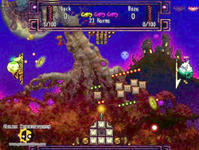 Tim: What can we expect in the next patch? bug fixes? or some new features?
Tim: What can we expect in the next patch? bug fixes? or some new features?
Jason: I'm going to work on making the game more configurable and easy to learn. We'll also be tweaking levels and making new levels.
Tim: Was online multiplayer ever considered?
Jason: Yes, but I like the interaction of face-to-face gameplay since you can slap your opponent when you beat them.
Tim: What is next for Little Gods? Expansion packs?
Jason: There is an expansion pack coming if the game sells significantly: 2 new characters, 2 new arenas, a bunch more levels, and new game objects.
Tim: How will new arenas be distributed? And will it be offered for free?
Jason: Arenas probably won't be offered for free. They require a lot of art and effort. Hopefully some creative and patient players will create more levels for it, which we hope to host and let other players download.
Tim: How much participation can we expect from the fans? Besides creating arenas, is it possible to create new characters as well?
Jason: You can only create new levels with the editor.
Tim: Are you planning any contests for arena designs? prizes?
Jason: I'm kicking around some ideas but it's too early to say.
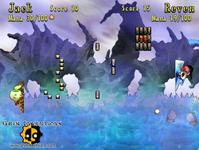 Tim: Future projects from Grim Inventions?
Tim: Future projects from Grim Inventions?
Jason: Our next game is going into pre-production soon. It involves a 1910-era setting and... insects. That's all I can say right now.
Tim: How well do you think Little Gods will fare? What are your expectations?
Jason: I don't expect a runaway hit, but it might do ok.
Tim: The character designs for Little Gods were very impressive. Will they appear in other games from Grim Inventions? Did you ever had any plans for a comic based on the characters, perhaps to flesh out the story?
Jason: The characters won't be reused, probably. We have so many ideas it'll be difficult to stick with any single one unless it's really a big hit.
Tim: Any recent independent title you're enjoying or have an eye on?
Jason: I really liked Oasis and Trade Winds 2.
Tim: Is there some dark secret about Little Gods that you wouldn't mind sharing with us?
Jason: The darkest secret about Little Gods is that I wanted to wear a beanie the whole time I was programming. Maybe for the next game.
 Tim: Anything you'd like to say to convince others to try out the game?
Tim: Anything you'd like to say to convince others to try out the game?
Jason: Little Gods takes some effort since it's got depth, but it pays back your effort with addictive fun. That sounded like marketing hyperbole, but it's true!
Tim: Any advice for other indie developers out there?
Jason: I'm not successful so I shouldn't give any advice, but my one insight is that you really are better off sharing the pile of cash with someone who compliments your talents. Synergy is the term that comes to mind.
Tim: Alright, thanks for spending time with us to talk about Little Gods. I hope your game does well enough for you to consider a sequel.
Jason: Thank you!
By Tim W.
August 25, 2005

Little Gods could possibly the the best Breakout clone to come out of an independent developer this year. Grim Inventions uses the classic gameplay concept featured in Pong and Breakout to create their debut title, but with all sorts of extras and unlockable contents added by the developers for a rewarding gameplay experience. Also noteworthy is the graphics and audio treats that will keep fans glued to their monitor screens for some time.
We caught up with Jason McIntosh of Grim Inventions recently to talk about their latest release.
INTRODUCTION
Tim: Hi Jason. Thanks for taking time out of your busy schedule to speak with us. To start off, could you tell us about the people involved in the development of Little Gods?
Jason: There's me and Greg Tice, who did the art from concept to completion. Michael Huang (http://www.gamenoise.com/) did about 1/2 the sounds (the impressive ones, like the sounds of powers activating), and I did the rest. I licensed the music from shockwave-sound.com (nothing to do with the Shockwave you're thinking of).
I'm just your typical spikey-haired, black wearing, loud music-playing, rebellious father of three who happens to also make games. My only significant game development experience is an old total conversion for Quake II called Dawn of Darkness. Incidentally Greg worked with me on that, too. (Along with a huge team of guys, so don't go thinking we did it by ourselves.) If you dig really hard, you can still download Dawn of Darkness.
Greg is your typical black-wearing, loud music-playing, rebellious art genius. He's living in London to finish up art school.
 Tim: Any story behind the name Grim Inventions?
Tim: Any story behind the name Grim Inventions?Jason: It's an expression of my taste for dark, creative works. We're not really living up to it yet, but I'm building slowly. You'll probably see our games become less mass market and get a lot darker and more story-oriented as we achieve more financial independence. Right now I just want to feed the kids. They eat like locusts.
Tim: Any previous projects?
Jason: We had a few partial/prototype games and a couple mods of various types that may later become full games.
DEVELOPMENT PROCESS
 Tim: How long did it take to develop Little Gods?
Tim: How long did it take to develop Little Gods?Jason: It took us about 1 year, although only about 6 months once I got Torque2D since the game art was mostly done by then. I had created my own engine in C++ but then decided to license Torque2D because it lifts the burden of maintenance and bug-fixing a lot so I can focus on the games more.
Tim: How about the engine and tools used?
Jason: A lot, actually. Torque2D, Eclipse editor, vaseline, Visual Studio 2003, Paint Shop Pro, clay and resin, Wacom digital tablet, and a whole lot of caffeine. About a mountain of caffeine.
Tim: Can you share with us your thoughts on the torque engine?
Jason: If you don't want to work a certain way or are a stubborn goose, then it won't float your boat. If you can adapt to its way of doing things, it will serve you pretty well. Torque2D isn't quite feature complete, but overall it's a very nice, shiny piece of work.
ARGUS TEACHES MULTIPLICATION FACTS
 Tim: Do tell us a little about your other project, Argus Teaches Multiplication Facts.
Tim: Do tell us a little about your other project, Argus Teaches Multiplication Facts.Jason: Originally I made that for the my kids, and it turned out nice so I asked Greg to hook me up with some art, and we put it out for sale. I learned my math facts all over again while testing it. So I know it is effective!
Tim: How was the response for that game?
Jason: It's a specialized product in a very hard to reach market, so it's been rather slow, let's say. Mac users seem to really like it, though. All sales are from the Mac version. I don't know what that means about PC users.
 Tim: Any knowledge from developing Argus that proved useful when creating Little Gods?
Tim: Any knowledge from developing Argus that proved useful when creating Little Gods?Jason: Yes, everything I did in Argus helped me with Little Gods, so that's the real payoff. I learned Torque and got the work done a lot faster because of it.
LITTLE GODS
Tim: How does your working schedule sounds like, while doing development for Little Gods?
Jason: Let's see. I punt the kids onto the bus, kiss my lady as she heads off to work, walk bleary-eyed to my office downstairs, miss the chair when I try to sit down, fall straight on my ass, wake up immediately when I hit the floor. Then I plug into the caffeine I.V., fire up the editor and start coding.
Tim: What was the biggest difficulty you've faced while developing the game?
Jason: Making it to the end. Really, there were a lot of times I want to poke out my own eyes because I was so sick of the game, but the professionals finish--and so I had to put new batteries into my cyborg clone and let him do most of the real work.
Tim: Were there any other names considered for the game? Why did you choose the name Little Gods?
Jason: Little Gods refers to the fact that you have god-like powers but you aren't really a deity. The characters in the game are only given their powers by Pillboa (the big kahuna of the realm), so they're kind of Rental Gods, if you prefer that name.
 Tim: How did the idea for Little Gods came about? And what was your inspiration for making the game?
Tim: How did the idea for Little Gods came about? And what was your inspiration for making the game?Jason: The gameplay was developed organically, but started based on an old Amiga game I made about 6 thousand years ago. I usually got new ideas while about to fall asleep after an 18 hour programming massacre and then forced myself to rise and write it down. I think a lot of weaknesses in the interface are from these changes that came late in the process.
Tim: What about the story? Did you ever had plans to include cutscenes to tell the story?
Jason: There was a Story Mode in the game that told the story of each character, why they were in this place doing this ridiculous ritual with these little pillbug creatures (the balls). The story is basically that your character has died and really screwed up something, and by a strange twist of fate you landed in this realm called The Everything where you have a chance to get your life back and live it the right way this time. So that's what the duel is about. You are fighting to get your life back for one reason or another, and each character has a story about this. I took out Story Mode because it was taking too much time to develop. Secondarily, the stories I created were really too serious and dark for this game.
We considered doing some comic-style stuff, but probably won't. That idea is not dead, though, so you can expect some of our later work to include that type of thing as promotional material.
Tim: The music, the production style, it's kind of like something that Tim Burton would do if he ever produced a game. has anyone else suggested this as well?
Jason: That's very flattering to hear! But it's really just a combination of my tastes and Greg's style. I knew I didn't want any techno or loud rock and roll music. I wanted something totally different to disarm players with. And the art style was a decision to try and balance a dark look with cuteness. Greg is very good at that.
 Tim: Could you describe a little about the game modes available for those who are reading this interview and have not experienced the game itself.
Tim: Could you describe a little about the game modes available for those who are reading this interview and have not experienced the game itself.Jason: The main game is basically Pong. You knock the ball back and forth and try to make your opponent miss so you get a goal. But also it's like Arkanoid because there are bricks in the middle that you can smash up to get trinkets and goodies from. But as a whole it's like neither, because the bricks in the middle move and respond to what you do, and then you can invoke your god powers and affect your opponent or the balls to help win the match.
The unlockable modes are pretty simple but offer a new kind of challenge for the levels. For instance, Rapid Attack is a mode where you go really, really fast and so do the balls. The rounds are over quick because you usually can't get the balls fast enough, but it's a lot of fun to try.
Tim: Will mouse controls be implemented? i noticed that this option wasn't available for players.
Jason: I'm still debating with myself about it.
Tim: I kept expecting to hear voice or some sort of speech from the characters. Was this ever considered for the game?
Jason: We had all kinds of stuff planned, but time killed most of it. I wanted to have blurbs for each character at the end of a round when they won or lost to give them more personality. We just ran out of time.
 Tim: Any thing you're particularly proud of about Little Gods? Something that you didn't think was possible for this project but you've accomplished it in the end? Or a feature that other paddle games do not have, that would probably be copied by other developers.
Tim: Any thing you're particularly proud of about Little Gods? Something that you didn't think was possible for this project but you've accomplished it in the end? Or a feature that other paddle games do not have, that would probably be copied by other developers.Jason: The whole 2-player aspect is quite an attraction to me. It's a lot more fun to play with a group of people, because the game is as fun to watch as it is to play. That's something I didn't discover until a group of us played it and even the people who weren't playing had a really great time. There's stuff you won't see if you are playing because you get focused on the action, but every arena has special events and randomized visuals that make it fun if you happen to see
them.
Tim: What was the single hardest thing to implement while developing Little Gods?
Jason: The only struggle that we had was controlling the scope of the design. It could have spiraled into some huge Massively-Multiplayer RPG Pong thing, but I forced myself to keep it lean and trim off stuff we didn't absolutely need. That's very difficult!
Tim: Are there easter eggs or hidden secrets in the game?
Jason: There are 2 cheat codes in the full version.
Tim: In the game, it was mentioned that there were free stuff to download from the web site. are you referring to the gallery or is there something special?
Jason: There will be downloadable objects you can drop into the game. We're going to have a character or two, probably a power or two, and definitely some levels.
FUTURE PLANS
 Tim: What can we expect in the next patch? bug fixes? or some new features?
Tim: What can we expect in the next patch? bug fixes? or some new features?Jason: I'm going to work on making the game more configurable and easy to learn. We'll also be tweaking levels and making new levels.
Tim: Was online multiplayer ever considered?
Jason: Yes, but I like the interaction of face-to-face gameplay since you can slap your opponent when you beat them.
Tim: What is next for Little Gods? Expansion packs?
Jason: There is an expansion pack coming if the game sells significantly: 2 new characters, 2 new arenas, a bunch more levels, and new game objects.
Tim: How will new arenas be distributed? And will it be offered for free?
Jason: Arenas probably won't be offered for free. They require a lot of art and effort. Hopefully some creative and patient players will create more levels for it, which we hope to host and let other players download.
Tim: How much participation can we expect from the fans? Besides creating arenas, is it possible to create new characters as well?
Jason: You can only create new levels with the editor.
Tim: Are you planning any contests for arena designs? prizes?
Jason: I'm kicking around some ideas but it's too early to say.
 Tim: Future projects from Grim Inventions?
Tim: Future projects from Grim Inventions?Jason: Our next game is going into pre-production soon. It involves a 1910-era setting and... insects. That's all I can say right now.
Tim: How well do you think Little Gods will fare? What are your expectations?
Jason: I don't expect a runaway hit, but it might do ok.
Tim: The character designs for Little Gods were very impressive. Will they appear in other games from Grim Inventions? Did you ever had any plans for a comic based on the characters, perhaps to flesh out the story?
Jason: The characters won't be reused, probably. We have so many ideas it'll be difficult to stick with any single one unless it's really a big hit.
Tim: Any recent independent title you're enjoying or have an eye on?
Jason: I really liked Oasis and Trade Winds 2.
Tim: Is there some dark secret about Little Gods that you wouldn't mind sharing with us?
Jason: The darkest secret about Little Gods is that I wanted to wear a beanie the whole time I was programming. Maybe for the next game.
 Tim: Anything you'd like to say to convince others to try out the game?
Tim: Anything you'd like to say to convince others to try out the game?Jason: Little Gods takes some effort since it's got depth, but it pays back your effort with addictive fun. That sounded like marketing hyperbole, but it's true!
Tim: Any advice for other indie developers out there?
Jason: I'm not successful so I shouldn't give any advice, but my one insight is that you really are better off sharing the pile of cash with someone who compliments your talents. Synergy is the term that comes to mind.
Tim: Alright, thanks for spending time with us to talk about Little Gods. I hope your game does well enough for you to consider a sequel.
Jason: Thank you!
Recent Comments
Recommendations
Previous Posts
• James Whitehead Interview• Evil Invasion Interview
• Indiana Jones and the Fountain of Youth Walkthrough
• Axiomatic Interview
• Cedric and the Revolution Walkthrough
• A Cure for the Common Cold Walkthrough
• Penumbra Walkthrough
• Chronon Walkthrough
• Duty and Beyond Walkthrough
2007 © Independent Gaming.